
Anti-Gay Bill: Supreme Court defers injunction ruling, directs early trial
The much-anticipated Supreme Court decision on whether to restrain Parliament from transmitting the Human and Sexual Rights and Family Values Bill, popularly known as the Anti-Gay Bill, to the President for his assent, will be delivered at a later date.
The court yesterday decided to defer the ruling on the application for interlocutory injunction to the same date it delivers a judgment on the substantive suits challenging the constitutionality of the passage of the bill.
In a unanimous decision, a five-member panel of the apex court presided over by the Chief Justice, Justice Gertrude Sackey Torkornoo, held that the determination of the interlocutory application and the substantive suits together was in the interest of justice.
“Our decision to consider both the interlocutory application and the substantive suits together will enable this court to deliver a more informed, comprehensive and just decision that accounts for all relevant circumstances and factors in this important matter.
“Such a unified approach will further provide context and clarity and also afford a clear understanding of the issues raised in this interlocutory matter and their impact on the main suits,” the Chief Justice ruled.
Early trial
The court also held that instead of ruling on the application for interlocutory injunction immediately, it would rather expedite the trial of the substantive suits in accordance with Order 25 rule 5 (1) of the High Court (Civil Procedure) Rules, 2004 (C.I47), which allowed an early trial instead of the determination of the merits of an application for interlocutory injunction.
“We also hold the view that an early trial of the action will serve the course of justice better in view of the fact that it will render a clear view of the constitutional issues raised better than the sustained dispute over interlocutory matters,” the court ruled.
Effect of the decision
The two injunction applications were filed by Dr Amanda Odoi, a researcher and human rights activist, and Richard Sky, a broadcaster, who have both filed separate suits challenging the constitutionality of the passage of the Anti-Bay bill by Parliament.
The two applications for interlocutory injunctions are seeking to restrain Parliament from transmitting the bill to the President for his assent until the final determination of the two substantive suits.
Although the Supreme Court is yet to rule on the interlocutory application, the effect of the apex court’s decision to defer the ruling on the interlocutory injunction to the day the suits are determined is likely to still restrain Parliament from transmitting the bill to the President.
It is the position of the law that if an application for an injunction is pending, the status quo of a suit ought to remain until a court rules on the application.
What this means is that as it stands now, Parliament cannot transmit the bill to the President for his assent since the applications for the interlocutory injunction are yet to be determined by the Supreme Court
Such views were shared by counsel for Mr Sky, Paa Kwesi Abaidoo, and the Attorney-General, Godfred Yeboah Dame, after yesterday’s proceedings.
Mr Dame said the court was yet to determine the application for interlocutory injunction and therefore the status quo must remain. “The court has still not disposed of the application for interlocutory injunction. What the court has done is to reserve its determination until the main action is heard,” he said.
For Mr Abaidoo, any attempt by Parliament to transmit the bill to the President would be contempt of court. “So as far as this application is pending, Parliament cannot transmit the bill to the President, otherwise it will amount to contempt of court,” he said.
Plaintiffs’ case
In their respective suits, the two plaintiffs are of the contention that the process by which the Anti-Gay Bill was passed by Parliament violated Article 108 of the 1992 Constitution.
Article 108 of the 1992 Constitution stipulates that any bill before Parliament which would have an impact on the consolidated fund should be introduced by or on behalf of the President.
It further stipulates that in the event a bill is introduced by any entity other than the President or on behalf of the President, the person presiding in Parliament must give an opinion on whether the bill would have an impact on the consolidated fund before it is laid before Parliament.
It is the contention of the two plaintiffs that the anti-gay bill, which was a private member’s bill, failed to follow the dictates of Article 108 of the 1992 Constitution.
According to the plaintiffs, the bill will put a charge on the consolidated fund because under the bill, persons convicted of homosexuality can be jailed, which imposes costs on the state.
In view of that, they averred that the Speaker of Parliament breached Article 108 of the 1992 Constitution by not giving an opinion on whether the bill, when implemented, could lead to financial consequences on the country through a charge on the consolidated fund.
Anti-Gay Bill
On February 28, this year, Parliament passed the Human and Sexual Rights and Family Values Bill, which was a bi-partisan private member’s bill.
If assented to by the President, the bill, which enjoyed overwhelming support of members of the House, will impose a three years minimum jail term and five years maximum incarceration on those who engage in and promote homosexual activities in the country.
It has thus criminalised and prohibited pro-gay advocacy, as well as those who fund the activities of lesbian, gay, bisexual, transgender, intersex, queer/questioning, asexual, among other such people.
The passage of the bill has since generated diverse reactions, with its opponents describing it as a drawback of the human rights status of the country, while proponents insist it was necessary to guard against the normalisation of homosexual activities.
President Nana Addo Dankwa Akufo-Addo has indicated that he would only act on the bill after the Supreme Court had determined the suits challenging the constitutionality of the bill.
Writer’s email:
